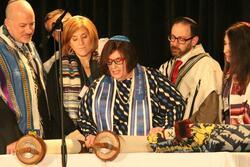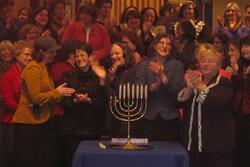Reimagining ‘Rebbetzin’: On Being a Feminist Rabbinic Partner
In this second piece from our Reimagining ‘Rabbi’ series, JoJo Schwartz Jacobson, who is married to a congregational Rabbi, responds to this clip:
Sometimes I wonder if I'm not feminist enough.
I clean the house, and I bake challah, and I complain to my spouse about coming home too late in the evenings. I’m a great rebbetzin––but isn’t a rebbetzin a bizarre and archaic role that enables the patriarchy? For centuries, Jewish communities have relied on rabbi's wives to provide essential support to the rabbis and the congregations themselves––taking on 100% of the domestic labor, hosting endless meals and guests, even teaching and offering pastoral support––for no money and little recognition. By embracing the rebbetzin role––even if I love it ––am I perpetuating this misogynistic pattern?
Dianne Cohler-Esses demonstrates the problem of rebbetzins perfectly in her description of her senior year of rabbinical school. The dean and her entire cohort just assumed rabbis would have wives at home to cook and clean for them; all the housework and important holidays would just be magically taken care of because of the hardworking rebbetzins.
When Cohler-Esses asks how rabbis are supposed to make sure their homes are ready for Shabbat, the dean is stumped––the sexism isn’t so much about malice as it is about ignorance. In an all-male cohort, he could have simply responded, “your wife will do that.” In an all-male cohort, it would have been obvious; no one would have asked.
The dean did not tell Cohler-Esses that her wife would take care of the home for Shabbat. At the time, that would have been silly.
But now here I am, the wife of Rabbi Suzie Schwartz Jacobson; this is a role that was unimaginable just a few years ago.
I am a queer rebbetzin, and my cooking and cleaning makes it possible for Suzie to change the world. I show up to Friday night services in modest dresses and cute hats, and when I give Suzie a peck on the cheek before oneg, the world becomes a more tolerant place. The simplest actions set groundbreaking precedents and upend thousands of years of sexism and homophobia.
And yet––the role of the rebbetzin has not changed much, despite the fact that there are now female rabbis and queer rabbis. Even with female rabbis, even with queer rabbis, there is still a vague hope that rabbis who are hired to work in congregations will come in a boxed set, complete with a friendly Jewish spouse and adorably well-behaved kids.
Rebbetzins still face a scrutiny and pressure that the spouses of, say, doctors, do not. In a congregation, rabbis become parent figures to hundreds of people––they are wise and moral and compassionate, and they counsel people in times of need. The spouses of rabbis become parent figures as well, with congregants subconsciously expecting us to open our doors to them, bringing infinite love and infinite time to chat. As much of a gift as this role can be, it also adds up, leading to hours and hours of unpaid domestic and emotional labor.
Now that some rebbetzins are men, the expectations for clergy spouses have somewhat lessened. Because of our society’s deeply embedded sexism, we expect that male clergy spouses will have careers of their own and therefore accept that they have less time for domestic work and being around shul. We don’t usually extend the same generosity to women married to rabbis. My guess? A male clergy spouse could ditch High Holy Days and still be respected, but I would be considered a bad rebbetzin for attending the same services and not smiling enough. And in the end, male clergy spouses can sometimes create more pressure for straight female congregational rabbis because they don’t behave like a traditional rebbetzin—many female rabbis pull a kind of heightened double shift, spending long hours at work and then spending long hours pulling the house together. It’s not easy.
I can’t totally resolve this tension. I know I feel lucky to be one of those spouses of female rabbis who feel comfortable in our roles in the congregation, and who view it as a sacred duty to help support our amazing spouses in their work. Rabbis don’t just need wives at home, they need partners. They need strong and smart people who love them and can do a few extra dishes and proofread sermons. Perhaps the most radical thing one can do in this day and age is support a strong woman in a leadership position.
Maybe I am feminist enough after all.
Love JoJo's reflection? Want to stay up to date on our weekly Reimagining 'Rabbi' series? Let us know!








Love this JoJo! I BELONG TO TI and adore Suzie!
I came across this article, and while it's old, there was just a point I want to clarify. "the idea that wives are expected to take on 100% of the domestic labor, hosting endless meals and guests, even teaching and offering pastoral support––for no money and little recognition. " is not accurate. I'm an orthodox Jewish woman and my husband has shown me sources about gedolim who cleaned up for shabbos and helped with domestic work and in chosson classes, orthodox men are taught that everything must be in balance, and so you cannot go on and learn all day if you're wife is breaking down while taking care of the kids and house. As such, my husband and many others are helping with many household or childcare duties and/or we hire help if it's needed. Also, any man who offers to host without consideration of his wife's feelings would be breaking halacha. And so any woman who does ALL the domestic work including cooking, cleaning, childrearing and more and is constantly hosting is either doing so of her own volition OR it's being done not as a representation of what Torah actually outlines for Jewish homes.
much love
Ora Drexler